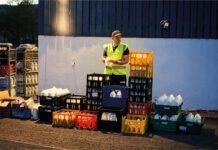ANIMAL welfare is a growing consumer issue, with a new study showing that eight out of 10 UK shoppers want labels which clearly show the farm system that has been used to produce their meat, say activists.
Compassion in World Farming and RSPCA research is said to have found that 83% of shoppers want to extend the labelling used for eggs, which clearly identifies the method of farming used to produce the product, rolled out. Almost as many – 79% – said farm animal welfare was important when deciding which food products to buy.
Julia Wrathall, head of farm animals at the RSPCA, said: “Despite a clear method of production labelling of eggs, and new EU legislation to label fish by method of catch, consumers are still kept in the dark about the farm systems used to produce the vast majority of their meat and dairy products.”
Throughout the EU, eggs have been labelled by method of production since 2004. There are four classifications: ‘eggs from caged hens’, ‘barn eggs’, ‘free range’, or ‘organic’. That change has, according to CIWF, dramatically increased the number of eggs produced in cage-free systems.
83% want egg-style labelling on meat
79% think animal welfare “important”
Method-of-catch labelling for fish was agreed by the EU in June.
Wrathall continued: “It can be extremely difficult for consumers trying to buy higher-welfare products. So many meat and dairy labels use misleading language and images to suggest good welfare even when the animals have been reared in standard intensive systems. As we have seen with eggs, consumers have the power to drive improvements in farm systems, but they can only do this if there is honest, comparable information on products they buy.”
The animal welfare organisations behind the study argue that their figures counteract the findings of a survey carried out in 2010 by the Department for Food, Rural Affairs and Agriculture – which the activists claim used a small sample – that showed labelling would have a limited effect on purchasing behaviours. It is, they say, quoted by the EC as evidence against more detailed labelling.
Philip Lymbery, chief executive of CIWF, commented: “It’s astonishing that Defra and the European Commission are still resisting clear, objective method of production labelling of meat and dairy products. Farming minister, David Heath, has repeatedly claimed that method of production labelling is too complicated. This survey directly contradicts the government’s position.”














